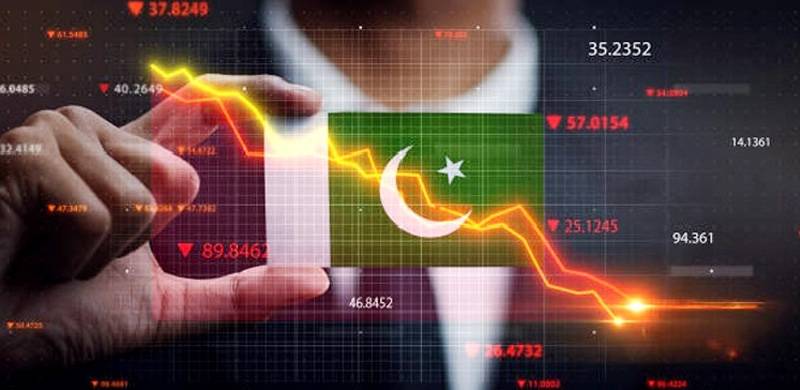
Introduction to The Precarious State of Pakistan’s Economy
Pakistan, a nation rich in history, culture, and potential, has been grappling with economic challenges for several years. The country’s economy has faced a series of crises and struggles, raising concerns about its sustainability and future prospects. In this article, we will explore the key factors contributing to Pakistan’s economic woes and examine the potential consequences if corrective measures are not taken.

Structural Issues
One of the fundamental reasons for Pakistan’s economic woes lies in its structural issues. The economy has long been characterized by a heavy reliance on agriculture, which employs a significant portion of the population but contributes relatively less to the GDP. This imbalance has hindered industrialization and diversification of the economy, leaving it vulnerable to external shocks.
Energy Crisis
Pakistan has grappled with chronic energy shortages for years, resulting in frequent power outages and disruptions to industrial production. The energy crisis has deterred foreign investment, stifled economic growth, and added to the burden of subsidies required to maintain basic services.
Fiscal Mismanagement
Fiscal mismanagement, including high levels of government debt, budget deficits, and inefficient tax collection, has exacerbated Pakistan’s economic challenges. The country has struggled to reduce its fiscal deficit and create a sustainable revenue stream, leading to increased borrowing and debt accumulation.
Inflation
High inflation rates have eroded the purchasing power of ordinary Pakistanis. Rising prices of basic necessities such as food and fuel have placed a heavy burden on households, exacerbating poverty and inequality. Persistent inflation erodes confidence in the national currency and discourages investment.
Political Instability
Political instability and frequent changes in government have contributed to policy inconsistency, making it difficult to implement long-term economic reforms. The lack of continuity in economic policies has deterred both domestic and foreign investors.
Security Concerns
Pakistan’s security situation remains precarious, with ongoing conflicts and terrorist threats. This instability deters foreign investment, disrupts economic activities, and diverts government resources away from economic development.
Army Intervention
Pakistan’s economy has faced numerous challenges, and one recurring theme in its history has been military intervention in civilian governance. While Pakistan’s military has played a crucial role in the country’s security, its involvement in politics has often had a detrimental impact on the economy.
Army interventions have disrupted democratic processes, resulting in political instability and policy inconsistencies. This instability has discouraged foreign investment and hindered the implementation of much-needed economic reforms.
Moreover, the military’s influence on economic decision-making can divert resources away from critical development initiatives, such as healthcare, education, and infrastructure. The military’s economic interests, often spanning various sectors, can create conflicts of interest that impede the country’s economic progress.
To address the precarious state of Pakistan’s economy, it is essential to maintain a stable and democratic political environment, free from military interference. This would enable the government to focus on implementing long-term economic reforms and attracting investment, ultimately helping Pakistan achieve sustainable economic growth.
External Debt
Pakistan’s external debt levels have surged, leading to concerns about debt sustainability. The country has borrowed extensively from international lenders, and servicing these debts consumes a significant portion of the budget. Failure to manage external debt effectively could result in a severe financial crisis.
Consequences of Economic Collapse
If Pakistan’s economic challenges are left unaddressed, the consequences could be dire:
Social Unrest: High unemployment, inflation, and economic hardship can lead to social unrest and protests, potentially destabilizing the country.
Reduced International Standing: A faltering economy can diminish Pakistan’s standing on the international stage, affecting diplomatic relationships and its ability to attract foreign aid and investment.
Human Development: Economic instability can hamper investments in healthcare, education, and infrastructure, hindering human development and exacerbating poverty.
Political Instability: Economic instability can lead to political instability, making it difficult for the government to function effectively and address pressing issues.
Security Challenges: An economically weakened Pakistan may struggle to address security challenges effectively, potentially leading to increased violence and conflicts.
Corruption in Pakistan
In the judiciary, allegations of corruption have raised concerns about the impartiality of the legal system, with accusations of bribes influencing court decisions. Such corruption erodes public trust in the justice system and impedes access to justice for ordinary citizens.
At the military level, while the armed forces have played a pivotal role in national security, there have been instances of corruption involving defense contracts and misappropriation of funds. These cases raise questions about accountability and transparency within the military establishment.
In the political arena, corruption is a persistent issue, with allegations of embezzlement, kickbacks, and nepotism. Political leaders have faced accusations of using their positions for personal gain, diverting resources away from critical public services.
At the government level, inefficient tax collection, misallocation of resources, and embezzlement of public funds have contributed to fiscal mismanagement. These practices hinder economic development and exacerbate the country’s economic challenges.
Addressing corruption in all these sectors is crucial for Pakistan’s sustainable development and the restoration of public trust in its institutions.
Moreover, the military’s influence on economic decision-making can divert resources away from critical development initiatives, such as healthcare, education, and infrastructure. The military’s economic interests, often spanning various sectors, can create conflicts of interest that impede the country’s economic progress.
To address the precarious state of Pakistan’s economy, it is essential to maintain a stable and democratic political environment, free from military interference. This would enable the government to focus on implementing long-term economic reforms and attracting investment, ultimately helping Pakistan achieve sustainable economic growth.
Other Factors
Pakistan’s economy has faced numerous challenges, and one recurring theme in its history has been military intervention in civilian governance. While Pakistan’s military has played a crucial role in the country’s security, its involvement in politics has often had a detrimental impact on the economy.
Army interventions have disrupted democratic processes, resulting in political instability and policy inconsistencies. This instability has discouraged foreign investment and hindered the implementation of much-needed economic reforms.
Conclusion
Pakistan’s economic challenges are multifaceted and deeply rooted, requiring comprehensive and sustained efforts to address them. While there have been attempts at reform, the pace of change has been slow, and political instability has often hampered progress.
To reverse the course of its economic collapse, Pakistan needs a concerted effort to address structural issues, improve energy infrastructure, implement fiscal discipline, and promote political stability. Additionally, efforts to enhance security and reduce external debt are essential. Only through coordinated and sustained efforts can Pakistan hope to overcome its economic challenges and unlock its true potential on the global stage.
Your comments will be appreciated.






![Mad Square (2025) [1080p] [WEBRip] [5.1] [YTS.MX]](https://img.yts.mx/assets/images/movies/mad_square_2025/medium-cover.jpg)





